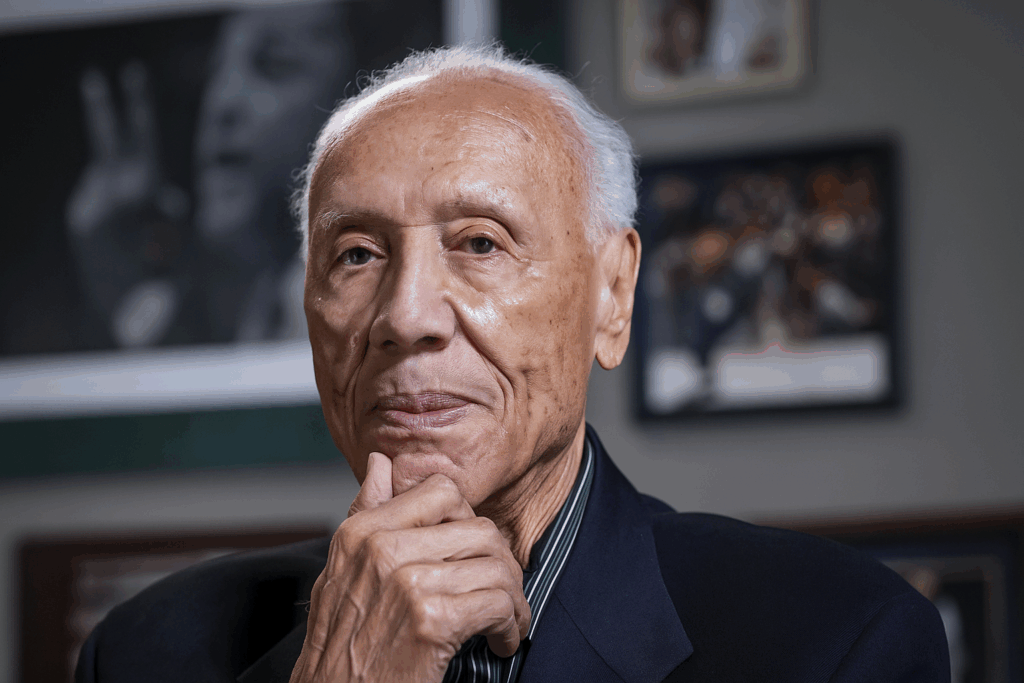Lenny Wilkens, the calm floor general who became one of basketball’s most enduring leaders and a three-time inductee into the Naismith Memorial Basketball Hall of Fame, has died at 88, his family announced Sunday.
His family said Wilkens “was surrounded by loved ones” when he died at his Seattle-area home. A cause of death was not immediately disclosed. The tributes that followed reflected a man who spent more than half a century shaping the game — as a player, coach, and mentor. His remarkable journey, from humble beginnings to a fixture in basketball history, touched countless lives.
“Lenny Wilkens represented the very best of the NBA — as a Hall of Fame player, Hall of Fame coach, and one of the game’s most respected ambassadors,” Commissioner Adam Silver said. “He influenced countless young people, players, and coaches as an extraordinary mentor who led with integrity and true class.”
Born Oct. 28, 1937, in Brooklyn’s Bedford-Stuyvesant neighborhood, Leonard Wilkens grew up in modest surroundings. After his father, a chauffeur, died when Wilkens was 5, his mother supported the family by working in a candy factory. Years later, young Lenny found solace on the neighborhood’s asphalt courts. Notably, despite not playing organized high school basketball until his senior year, his parish priest persuaded Providence College to take a chance on the quiet, left-handed guard.
Wilkens became a two-time All-American and guided the Friars to consecutive NIT appearances before being selected sixth overall by the St. Louis Hawks in the 1960 NBA Draft. With this transition to the professional stage, Wilkens’s story of perseverance and support moved from college courts to the NBA. He later described his early journey as a reminder of “how much you can achieve if someone just believes in you.”
At barely six feet tall, Wilkens compensated with extraordinary vision and composure. Over 15 NBA seasons with the Hawks, Seattle SuperSonics, Cleveland Cavaliers, and Portland Trail Blazers, he was a nine-time All-Star. Twice, he led the league in assists, and remarkably, scored in double figures in every season except his last. His 1968-69 debut in Seattle stands as his most productive, with averages of 22.4 points, 8.2 assists, and 6.2 rebounds. These accomplishments set the stage for the next major chapter in his career—his defining time with the Sonics.
The Sonics would go on to define his legacy. Initially, Wilkens was reluctant to take on the role of player-coach, and he later recalled, “We went around and around… I told them no at first. Finally, I decided, what the heck — I had nothing to lose.” The decision then reshaped both his career and Seattle’s basketball identity.
By 1979, he had coached the Sonics to the franchise’s first and only NBA championship, an achievement that cemented his status as the city’s basketball patriarch. “Leaders don’t yell and scream,” Wilkens told Seattle’s KOMO News earlier this year. “You lead by example — you teach, you listen.” This leadership philosophy resonated throughout the decades that followed, as Wilkens’s impact endured both on and off the court.
Over 32 seasons on the sideline, Wilkens compiled 1,332 wins — a record that stood for nearly a decade. His 2,487 games coached remain an NBA mark. He became the first coach to reach 1,000 career victories and was named NBA Coach of the Year in 1994 with Atlanta. Along the way, he guided five different franchises to the postseason and led Team USA to Olympic gold at the 1996 Atlanta Games, having previously served as an assistant for the famed 1992 “Dream Team.”
Rick Carlisle, the Indiana Pacers coach who succeeded Wilkens as head of the National Basketball Coaches Association, called him “a gentleman, an advocate for our profession, and one of the most eloquent voices this league has ever had.” Golden State’s Steve Kerr, who played under him in Cleveland, said Wilkens “carried himself with grace — you learned as much about life from him as you did about basketball.”
Beyond the numbers, Wilkens’ contributions to Seattle endured. His charitable foundation raised millions for community health initiatives, and in 2025, the city unveiled a bronze statue of him outside Climate Pledge Arena — its first monument to a basketball figure. Washington Gov. Bob Ferguson called him “a quiet force who united Seattle and uplifted generations.”
Wilkens’ résumé placed him in rare company: only he, John Wooden, Bill Russell, Tom Heinsohn, and Bill Sharman have been enshrined in the Hall of Fame as both player and coach. He joined it a third time in 2010 as a member of the Dream Team’s staff.
Through every chapter, his philosophy remained constant: “I always wanted to leave places better than the way I found them.” He did — from Brooklyn’s playgrounds to the global stage. The influence of Wilkens extended beyond records and trophies. And as the sport he helped shape continues to evolve, the quiet dignity of Lenny Wilkens endures as a model for what greatness looks like when it doesn’t need to be loud.


